
Many webmasters underestimate the importance of the choice of hosting for the SEO promotion of the site. Hosting is a kind of house for sites, and many aspects of the life of a web resource (blog, online store, news site, forum) depend on its "strength".
When choosing hosting, most users first of all pay attention to the size of the disk volume, which is offered at different tariffs. But there are other indicators that can affect the effective operation of the site and the ability to successfully promote it.
By what parameters and factors should the impact of hosting on site promotion be evaluated in order to make the right choice? Let's understand in more detail.
Site loading speed
Fast page loading is an important factor that affects traffic. The reader will not wait long for the page to load, he will simply close the tab and go to the faster site. To retain users, it is worth paying attention to speed indicators.

If the pages of your resource meet all the necessary conditions for their fast loading (compressed and optimized images, text and video materials, executable scripts, no "garbage" in the code) and at the same time the content takes a long time to load, then you should think about the correct choice of hosting provider.
On the hosting side, there are a number of technical parameters that affect the speed of loading site pages.
Server component level
The performance of hosting depends on the quality of the equipment used by the service provider. Search robots are impressed by sites whose servers quickly and efficiently process and generate information upon request. The less time spent on this process, the higher the site is rated by search engines. If the hosting servers are modern and powerful, the back-end infrastructure is high-quality and reliable, then it will be easier to reach high positions in the TOP.
It is worth noting that when choosing a good hosting provider that uses high-quality productive equipment, saving (or using free hosting services) is not recommended. Buying and maintaining high-tech components requires a lot of money, and there are no guarantees that free hosting will provide you with the same reliable and uninterrupted work at a high level as paid hosting. Therefore, if you are determined for a decent choice, security and quality of service, then do not save too much at this stage of site placement.
You can choose the cost of the service even before starting communication with the provider. The site has an open list of hosting tariffs , from which the webmaster can choose the most optimal option. Each tariff describes the detailed characteristics of the server equipment and the amount of disk space. Even the most budget hosting assumes the availability of high-quality technical support.
The PageSpeed module on hosting
The availability of PageSpeed module hosting will be a good bonus. It is installed on the server, and after purchasing the tariff plan, the client has the opportunity to use it. The main task of the module is compression and optimization of the graphic part of the website pages. Also, PageSpeed is able to conduct a detailed analysis of HTML code and give recommendations for its improvement.
Server caching tools
The availability of server caching tools on the hosting is a great advantage for the webmaster who uses the service. Caching of elements and operations on a resource speeds up the operation of the server due to the fact that the load on its computing power is reduced. Memcached, Opcache and Redis can be singled out as the best quality tools.
They allow you to compile and store repetitive operations in the server's RAM. Thanks to this, the dynamic elements of the site are not extracted from hard drives every time, but are transferred to the client browser according to a simpler and faster script.
Read also: Basic site loading speed metrics: TTFB, FCP, LCP and others
Continuous work
Another factor that determines the availability of the site. Agree, it's great when your site is available to visitors at any time.
The indicator of uninterrupted operation of the site is called Uptime. This metric shows the percentage of time the server is up. For example, an uptime of 95% means that 5% of the time the site is unavailable to users.
A normal (non-leap) year has 8,760 hours. An uptime of 95% tells us that the site will be unavailable for 438 hours in a year. That's a lot.
In such a situation, a random user goes to your site page and sees a message that "Page not found" and then leaves it.

What does it threaten? The trust rating of search engines for the site falls, which can negatively affect its ranking in search results. Do not forget that one of the main tasks of the hosting provider is to ensure maximum availability and uninterrupted operation of the site. If a website is down for even 10 minutes a day, it can cause some pages to be missing from the index.
Unfortunately, it is practically impossible to achieve 100% uptime, because no one is immune from accidental equipment or power supply failures. A value of 99.9% is considered a sufficient indicator. When choosing hosting, try to rely on this figure if you want your site to be accessible to both users and search engines.
Safety and reliability
The foundation of site security and reliability is laid at the stage of its creation. How safe it is depends mainly on the development. However, the impact of hosting is also important.
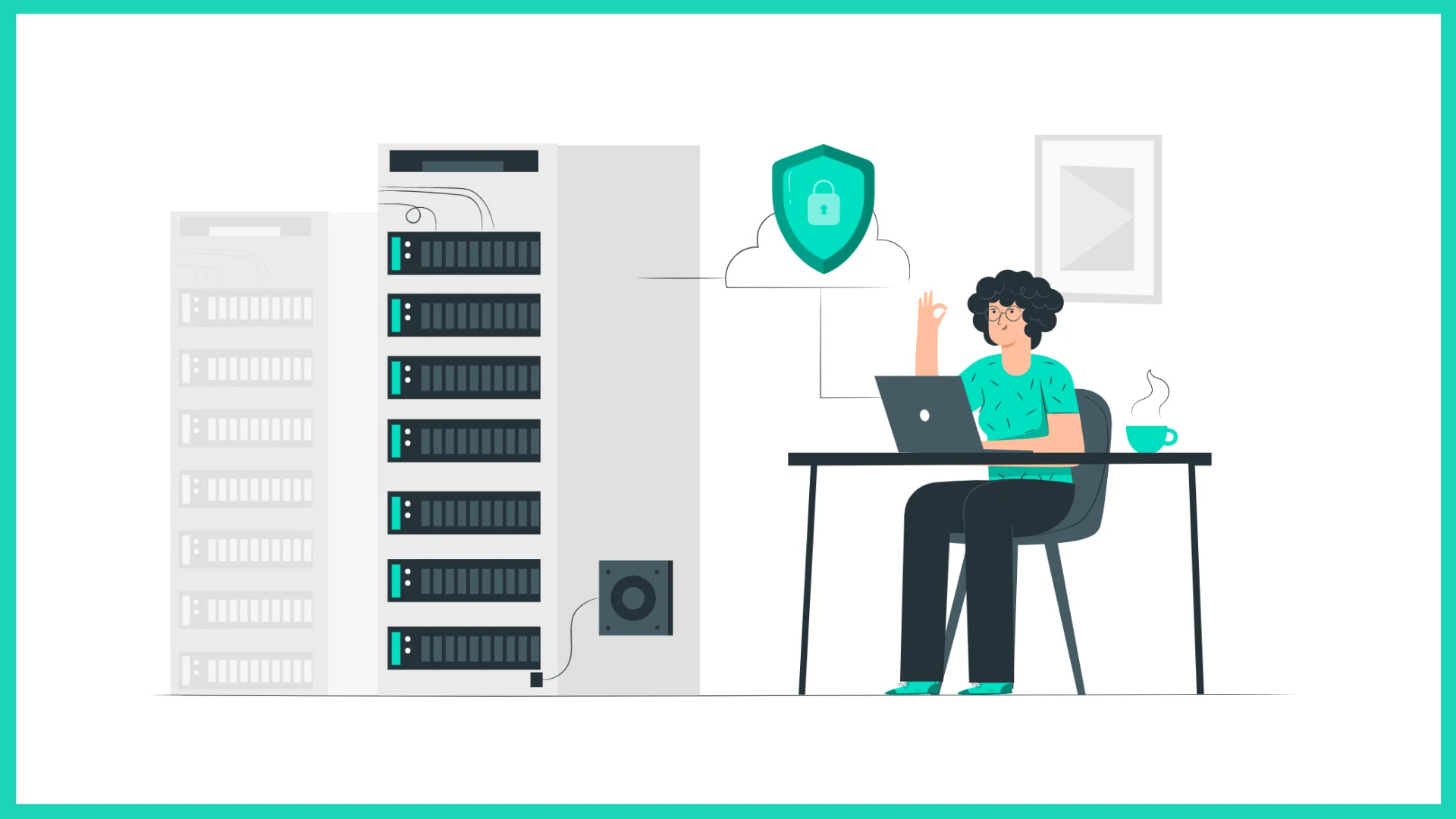
The chosen hosting provider must have developed algorithms for protection against DDoS attacks. Because every attack is unique, prompt professional technical support that quickly detects and manually combats DDoS is essential. The webmaster panel should have the necessary tools for basic self-defense: captcha, blocking of suspicious IP addresses, URLs, and user agents.
You can read more about this in the article " What is a DDoS attack and how to protect your site/server ".
It is important to have tools to detect viruses and malware on the site , which also affects the site traffic rate.
If a visitor receives a notification about suspicious content or the possibility of catching a virus on his PC when he goes to the site page, then consider that he will never return to your site. That is why regular checking for malicious elements is important in hosting.
Pay attention to the possibility of obtaining an SSL certificate when choosing hosting. The presence of SSL on the site is considered a guarantee of safety and reliability for users, especially when entering personal data, bank details, passport information, etc.
An SSL certificate encrypts and prevents attackers from intercepting data. Sites without SSL are less trusted by both users and search engines.

The ability to create backups (backup copies of site data) is an extremely important option for the stable operation of the project. Files or sections of code may be lost due to a technical failure or virus infection. The hosting backup system will help avoid unpleasant consequences and restore the necessary information.
Efficiency of technical support
Prompt, responsive and round-the-clock technical support is an important indicator of trust in a hosting provider. When a webmaster has a question or a problem, it must be solved quickly, constantly maintaining feedback. High-quality technical support is considered to be:
Quickly determines the essence of the webmaster's problem, promptly participates in the process of solving it with constant consultation on the issues that have arisen;
Always ready to take appropriate measures to reflect any computer attacks or minimize their likelihood;
Before disconnecting the site for non-payment of the tariff, it will remind that it is necessary to continue the paid use of hosting services;
Responds to customer messages 24/7.
Regarding the notification of the webmasters that the term of using the tariff plan is coming to an end, it is worth saying separately. Unfortunately, not every service's technical support works in a similar way and may not notify the client about the shutdown of the web resource. As a rule, this negatively affects its positions in search results, traffic and trust rating. So, at the initial stages of working with a new hosting provider, pay attention to the quality of technical support to avoid unpleasant situations in the future.
Read also: How to create a semantic core yourself
Services for determining the speed of sites
There are many online tools on the network that allow you to evaluate the speed criterion of various sites. Let's highlight the best of them.
SE Ranking
Site loading speed is only one indicator of its technical characteristics, so it is convenient for webmasters to use a tool that will determine all technical problems in a complex, including the speed characteristics of the resource. SE Ranking provides an opportunity to conduct a technical audit of the site with the formation of a detailed report and the analysis of various parameters (in particular, speed characteristics and performance).
The Overview section displays:
overall assessment of the site's condition;
the number of errors found and their criticality;
indicators of the quality of the user experience (download indicators are displayed here), etc.
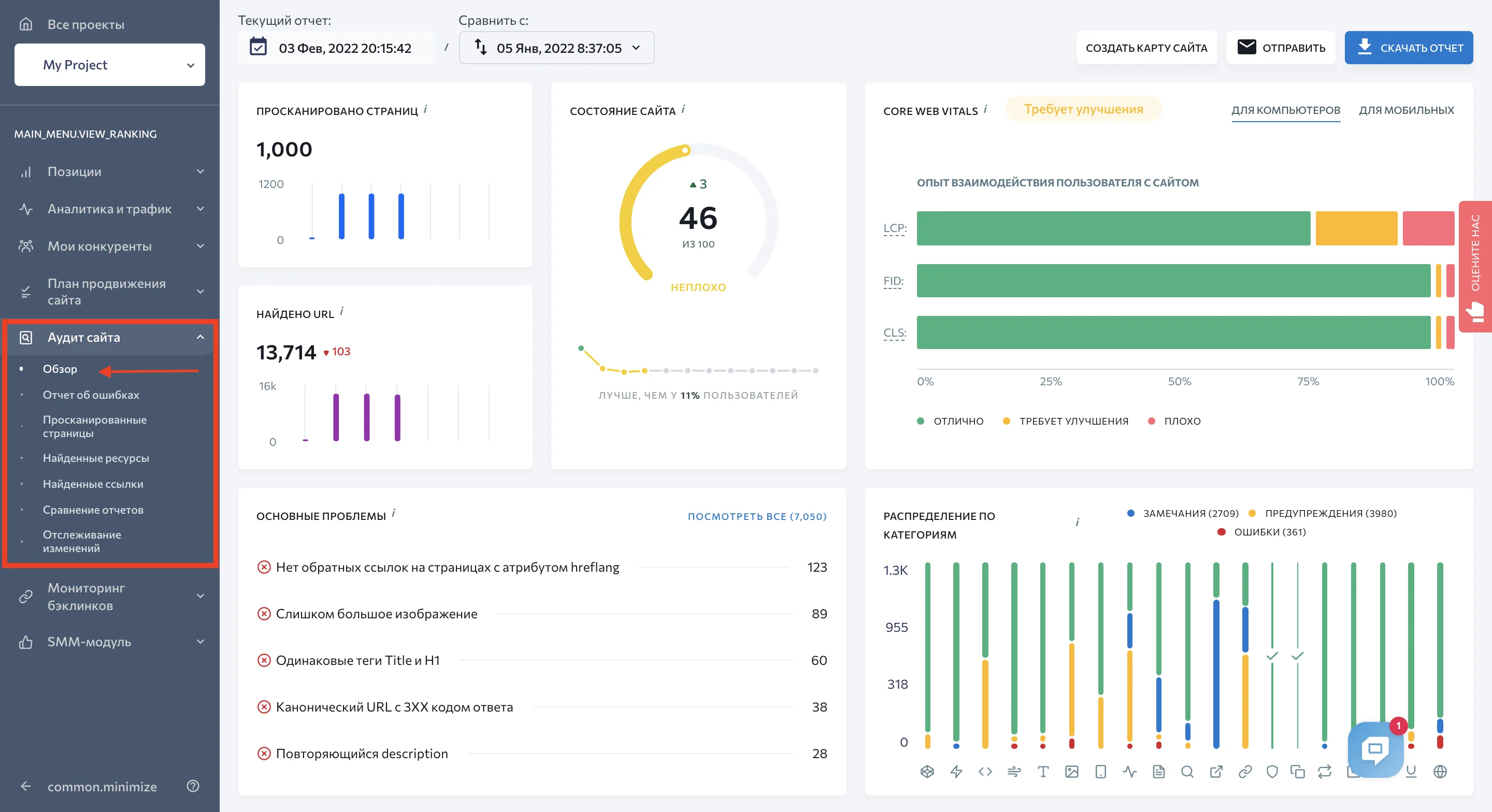
A detailed error report will contain detailed information about what specific problems the site is currently experiencing, including its speed performance. The great advantage of such a report is the ability to select a single problem from the list and receive a more detailed description with competent advice on how to quickly solve it.
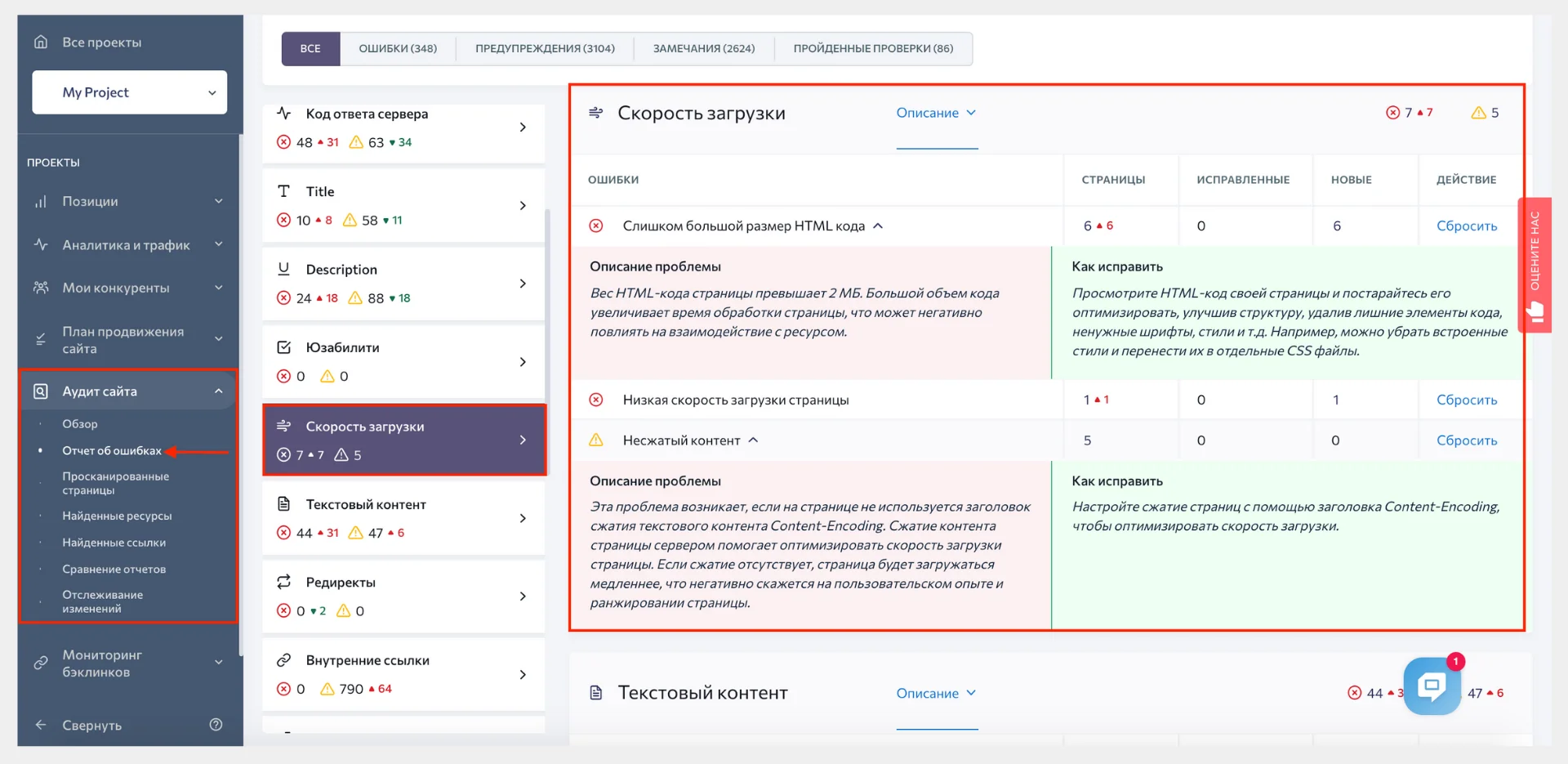
In addition to the site page loading speed parameters, the report will show the presence of robots and sitemap files (correctly configuring them), localization, redirects, HTML code quality, the total number of pages in the index, as well as how safe, reliable and easy to use the resource is, etc.
To use SE Ranking services, you need to complete the simplest registration, which will take a couple of minutes. Webmasters who use the service for the first time have a free trial - a period of free use of tools and modules for 14 days.
PageSpeed Insights
Google PageSpeed Insights is a free service from Google that provides a comprehensive set of tools for competent site optimization by analyzing actual performance. It is very easy to use. It is enough to enter a link to the site or a separate page in the corresponding line and perform the analysis. For example, let's take the well-known apple.com and analyze its speed indicators.
We get the following result:
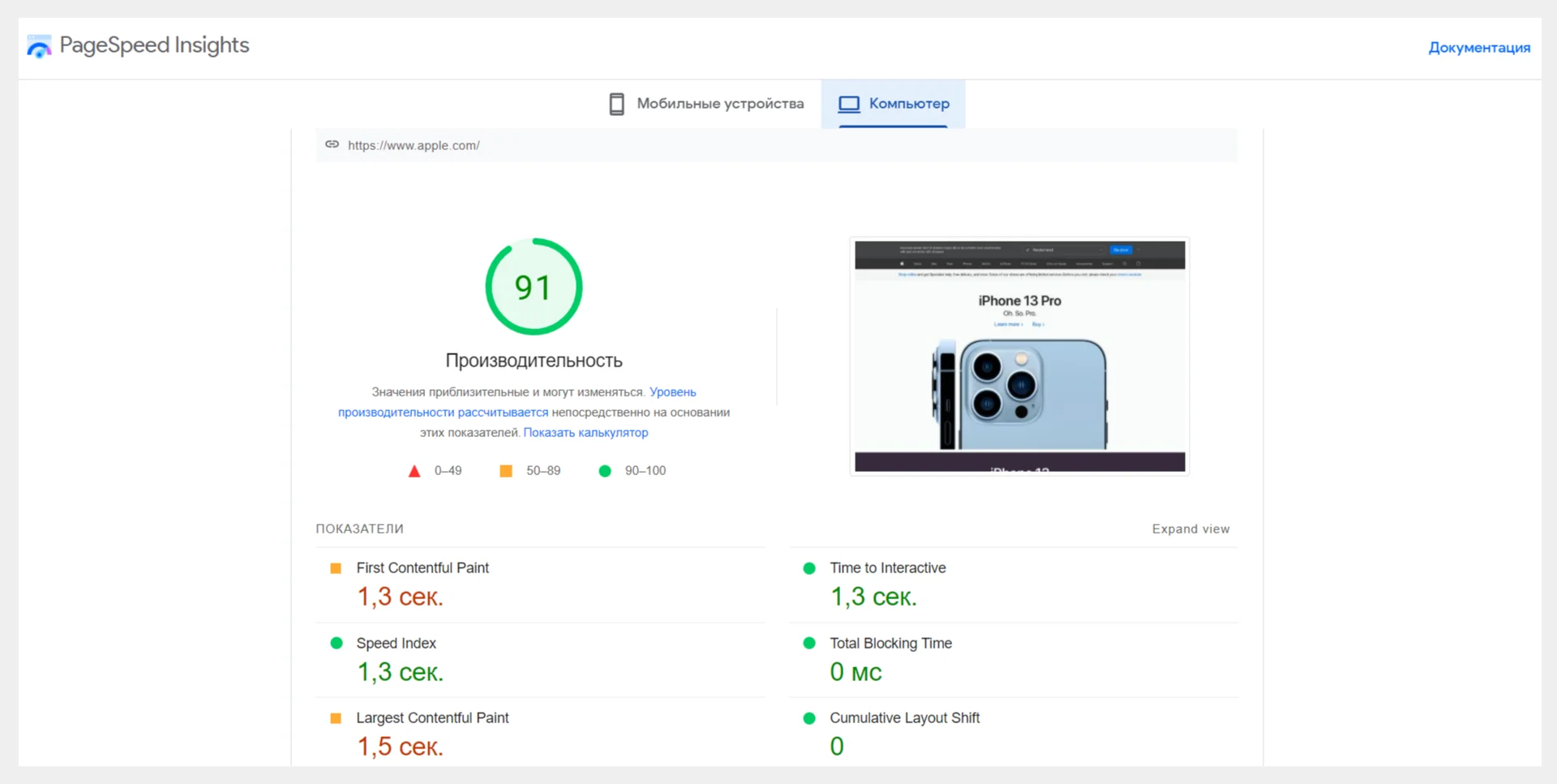
The analysis of the speed characteristics of the site was carried out for the mobile version and the PC. The loading speed of the site on the PC version is excellent, which cannot be said about the mobile version.
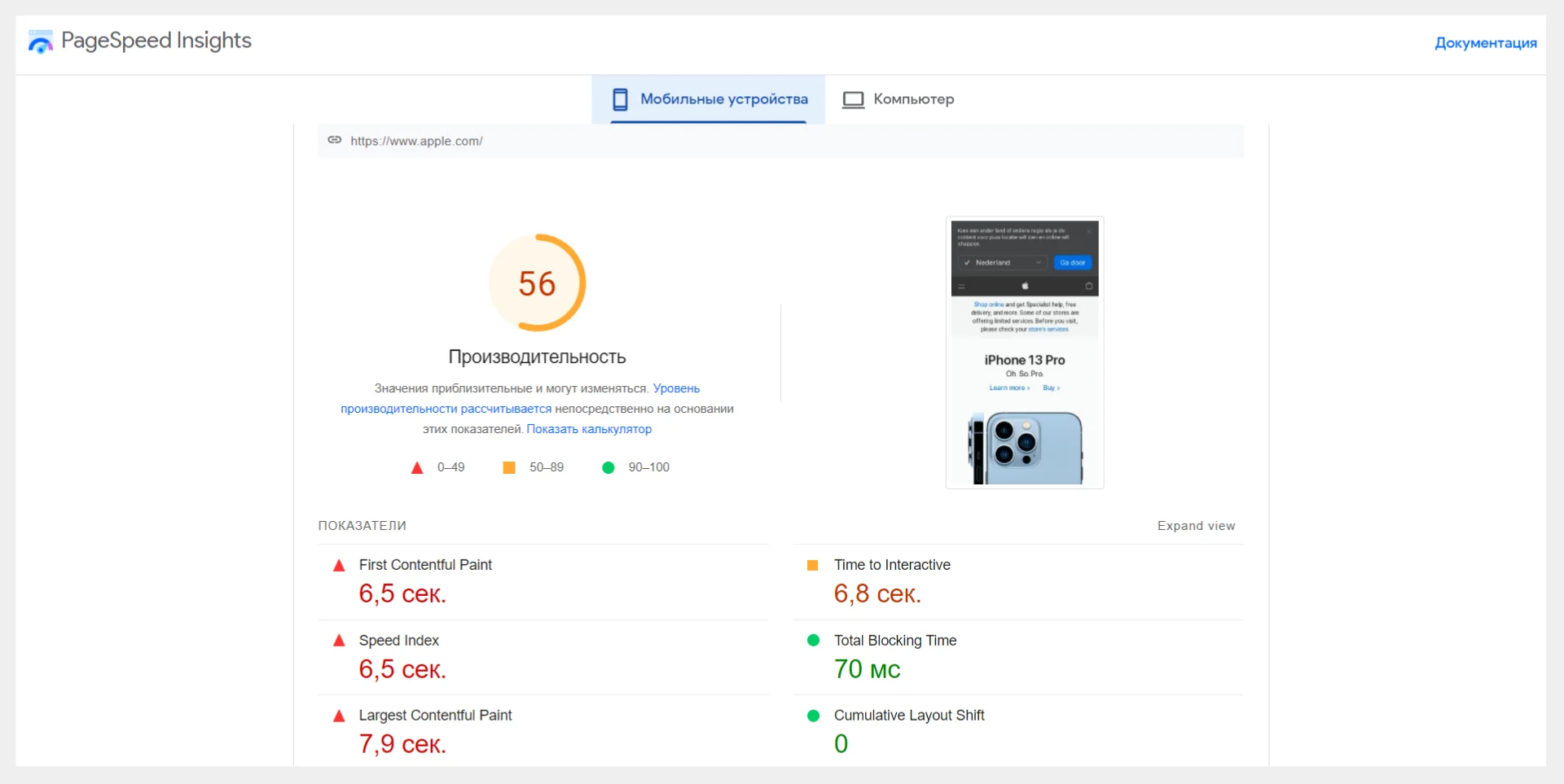
The main parameters analyzed by the service include:
First Contentful Paint (FCP) — the first display of content;
First Input Delay (FID) — waiting time before the first interaction with the content;
Largest Contentful Paint (LCP) — download speed of main content;
Cumulative Layout Shift (CLS) — cumulative layout shift.
Below you will be shown ways to solve the identified problems:
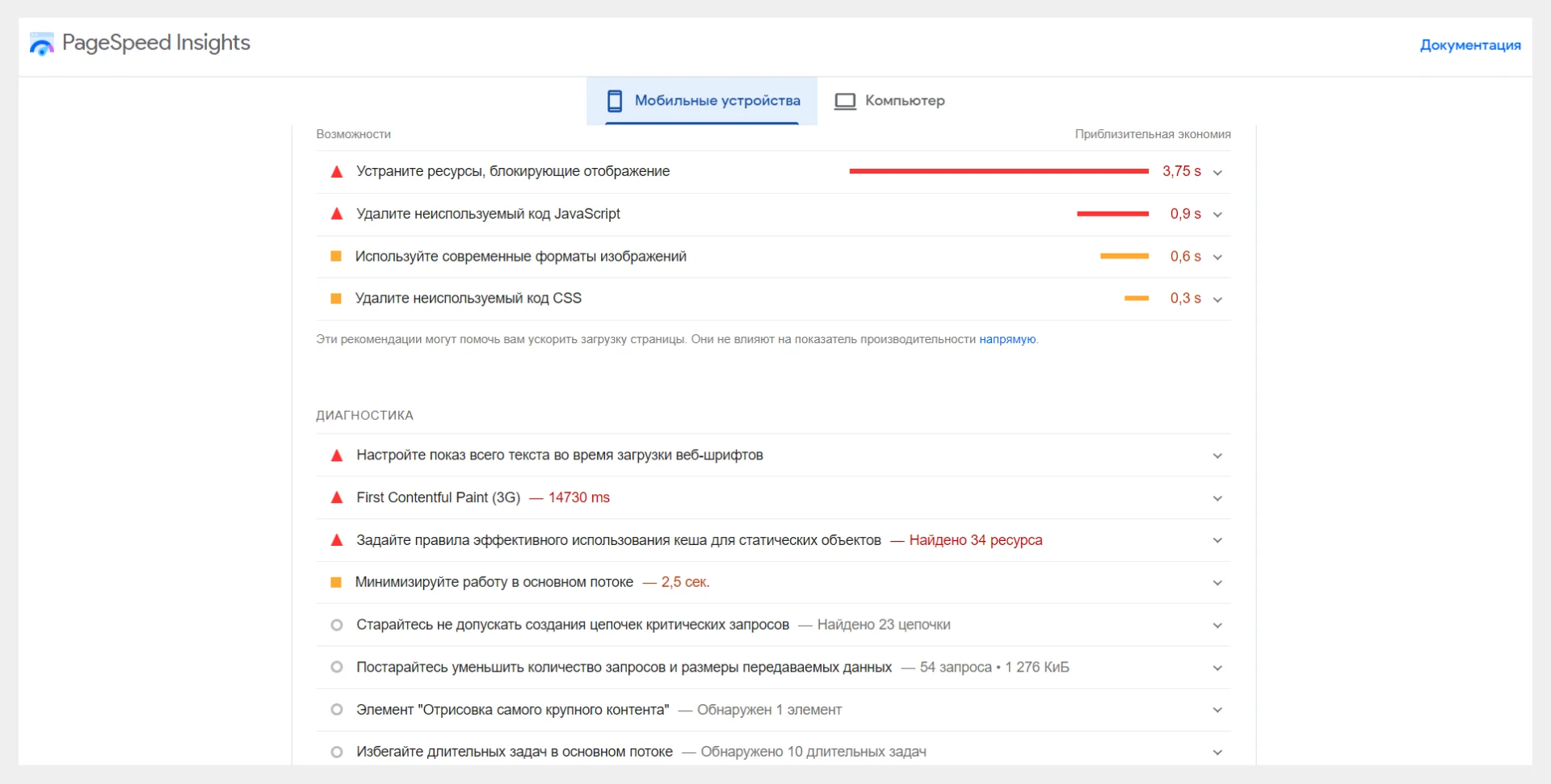
You can use the service on PCs and mobile devices. For the most part, PageSpeed Insights analyzes the technical component of web resources that do not depend on the types of Internet connection (scripts, cascade tables, code structures, sizes of text and graphic elements, etc.).
Sitechecker

Sitechecker is an SEO platform that has many useful modules in its arsenal, including a separate tool for determining site speed.
It will help determine page loading speed by analyzing the following parameters:
the presence of excess HTML/JS/CSS code (garbage), which increases the weight of pages;
site speed characteristics in various browsers (Chrome, Firefox, IE, etc.);
geolocation (that is, how quickly the site loads for users from different countries):
mobile and PC devices (the tool will show the speed of the site on different platforms — smartphones, tablets, PCs, etc.).
All you need to do to get a detailed report on speed indicators is to copy the domain of the site or its individual page, and paste the link into the Enter your domain field. Then click on Start. After the analysis, you receive a report on the detected loading speed problems and competent advice on optimizing the problematic pages.
In addition to analyzing site speed indicators, the platform offers webmasters SEO analysis of the site to detect other errors and vulnerabilities. Sitechecker has at its disposal a wide range of tools, multifunctional modules and a professional team of specialists that will help to bring a web resource to the top of search results, increase the trust rating of search engines for the growth of organic traffic.
***
All described services demonstrate comprehensive speed metrics that depend on many indicators: code quality, caching, file size, and more. Thanks to them, you can find out the overall loading speed of the site, analyze the "inhibiting" factors and understand in which case you can speed up the site yourself, and when its performance is affected by the quality of the hosting itself. There is another option — when the provider conscientiously performs its work, but the site loads slowly because it "doesn't fit" into the tariff.
When choosing hosting, immediately take into account the size of your web resource and choose the appropriate tariff plan with the necessary volume of disks on the server. If you want to get the maximum performance, reliability, availability, as well as high-end equipment, do not skimp on paid hosting, because the free one will not be able to provide all the features at the proper level.
The choice of hosting significantly affects the SEO promotion of the site. One of the most important factors when choosing a hosting for the normal functioning of the site is the speed of loading pages (response time, availability of caching), Uptime indicator (around 99.9%), smooth operation of servers, protection against hacker intrusion, as well as prompt technical support. The presence of these parameters in the hosting guarantees the normal and stable operation of the web resource, which, in turn, affects the quality promotion and growth of positions during the ranking in search results.









